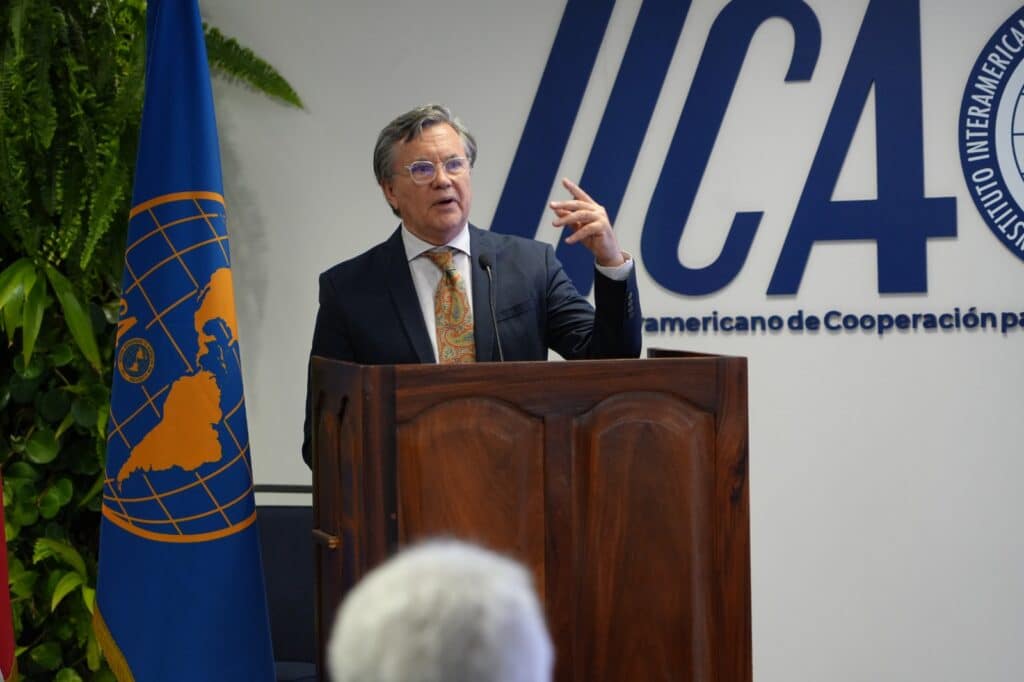
San Jose, 20 March 2025 (IICA) – The Inter-American Institute for Cooperation on Agriculture (IICA) has upgraded the Leadership School for the Transformation of Agrifood Systems of the Americas (ELTSA), an educational platform that offers training and capacity building programs, integrating knowledge, experiences, innovations and best practices, with a view to enhancing leadership capacities to fuel agricultural transformation in the Americas.
There was a presentation on the initiative at the “Cultivating Talent: Driving Science and Innovation in the Agrifood Sector of Europe and the Americas” meeting, which is taking place in Costa Rica. More than fifty experts have gathered for the event, including chancellors, deans and directors of academic institutions of higher learning from countries such as Brazil, Costa Rica, Chile, Dominican Republic, El Salvador, Guatemala, Honduras, Mexico, Peru, Panama, Spain and the United States.
ELTSA is an inclusive educational platform consisting of a coalition of institutions that promote food system transformation, by building the technical and leadership capacities of members of the public, private, entrepreneurial, production and academic sectors.
According to IICA Director General, Manuel Otero, “ELTSA is also a demonstration of progress made in integrating and coordinating efforts, positioning itself as a supra-program. Thus, we are seeking the support of all educational institutions of higher learning. Agriculture needs a new generation of leaders”.
Franklin Marín, Coordinator of IICA’s Center for Knowledge Management and Horizontal Cooperation Services, explains that ELTA’s training, capacity development and certification programs are geared towards decision makers in ministries of Agriculture and other public institutions in the Americas; technical officers in agricultural, economic, social and environmental organizations; researchers, academics and extension officers in educational centers; agrifood producers; undergraduate and post-graduate students in agrifood system-related fields; as well as other individuals with an interest in the development of the agrifood sectors.
Marín stressed that, “ELTSA is intended to provide these institutions with an additional tool, by offering its knowledge and inputs, to fuel the development of new leaders. It is a process of academic co-creation, developing new professional products, focusing on youth and current leaders in agrifood production”.
The Leadership School will forge strategic partnerships that will facilitate the mobilization of technical and financial resources to co-create programs that can be certified and that are capable of satisfying international standards of quality. It will also foster the establishment of networks to share resources, knowledge, programs and global expertise with universities and other educational and research institutions on issues of relevance to the agrifood sector.
Marín also pointed out that, “If we want to create an impact, we must collaborate with the entities that are responsible for training and developing leaders, engaging closely with educational institutions, such as universities, as a fundamental step in improving training and education. Likewise, we must ensure that our high-quality programs are accessible to everyone, incorporating technology and digitalization”.
During the event, it was also explained that one of the aims of the revamped ELTSA will be to promote the incorporation of innovations and new technologies in the search for greater productivity and sustainability of agrifood systems.
It was also proposed that academic programs be jointly developed, such as diploma programs, professional specializations or modular programs, based on international standards, which would be skills-based and self-paced. Another area that was emphasized was the importance of academic certification and opportunities for universities.

Franklin Marín, Coordinator of the Center for Knowledge Management and Horizontal Cooperation Services at IICA, stressed that ELTSA is intended to provide these institutions with an additional tool, by offering its knowledge and inputs, to fuel the development of new leaders.
Commitment and support
This initiative and IICA’s intention to drive interinstitutional collaboration was endorsed by various authorities from higher education centers who were present at the launch and who pledged to support its consolidation.
Chancellor of Universidad de Córdoba in Spain and President of Red INNOVAGRO, Manuel Torralbo, noted that, “Its name alone demonstrates its purpose – to create leaders that will transform agrifood systems. I congratulate IICA and will respond to the challenge that has been launched, to collaborate and exchange knowledge. We are on board and want to contribute to this school”.
“It is critical that we recognize the scope and benefits of this platform. Universities must provide our students with new tools; and this is what IICA is doing by bringing together, consolidating and cooperating with several schools, universities and institutes. This program addresses the needs of various countries and various regions. We need to create scientific, technological and innovation ecosystems in order to practice more sustainable agriculture”, said Zully Vera, Chancellor of Universidad Nacional de Asunción, in Paraguay.
On the other hand, the Director General of the Tropical Agricultural Research and Higher Education Center (CATIE), Luis Pocosangre, noted that ELTSA’s actions are aligned with the activities of CATIE and the school “can join with us to develop and implement new programs to contribute to agrifood systems and sustainable tropical agricultural production”.
IICA established ELTSA in response to recommendations arising from the United Nations Food Systems Summit, which was held in New York, in 2021. The Summit helped to position food systems, and particularly agriculture, at the highest level, as a driver of food security, socioeconomic recovery and the environmental sustainability of countries and the planet as a whole.
More information:
Franklin Marín, Coordinator of the Center for Knowledge Management and Horizontal Cooperation Services, IICA.
franklin.marin@iica.int











